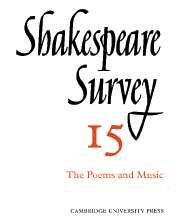Book contents
- Frontmatter
- Twentieth-century Studies in Shakespeare's Songs, Sonnets, and Poems
- Songs, Time, and the Rejection of Falstaff
- Shakespeare’s Sonnets and the Elizabethan Sonneteers
- Love’s Confined Doom
- Beasts and Gods: Greene’s Groats-worth of Witte and the Social Purpose of Venus and Adonis
- From Shakespeare’s Venus to Cleopatra’s Cupids
- Venus and the Second Chance
- Some Observations on The Rape of Lucrece
- An Anatomy of The Phoenix and The Turtle
- Shakespeare and the Ritualists
- Illustrations of Social Life IV: The Plague
- The Soest Portrait of Shakespeare
- International Notes
- Shakespeare Productions in the United Kingdom: 1960
- S. Franco zeffirelli’s Romeo and Juliet
- The Year's Contributions to Shakespearian Study 1 Critical Studies
- 2 Shakespeare’s Life, Times and Stage
- 3 Textual Studies
- Book Received
- Index
- Plate Section
The Year's Contributions to Shakespearian Study 1 - Critical Studies
Published online by Cambridge University Press: 28 March 2007
- Frontmatter
- Twentieth-century Studies in Shakespeare's Songs, Sonnets, and Poems
- Songs, Time, and the Rejection of Falstaff
- Shakespeare’s Sonnets and the Elizabethan Sonneteers
- Love’s Confined Doom
- Beasts and Gods: Greene’s Groats-worth of Witte and the Social Purpose of Venus and Adonis
- From Shakespeare’s Venus to Cleopatra’s Cupids
- Venus and the Second Chance
- Some Observations on The Rape of Lucrece
- An Anatomy of The Phoenix and The Turtle
- Shakespeare and the Ritualists
- Illustrations of Social Life IV: The Plague
- The Soest Portrait of Shakespeare
- International Notes
- Shakespeare Productions in the United Kingdom: 1960
- S. Franco zeffirelli’s Romeo and Juliet
- The Year's Contributions to Shakespearian Study 1 Critical Studies
- 2 Shakespeare’s Life, Times and Stage
- 3 Textual Studies
- Book Received
- Index
- Plate Section
Summary
‘Shakespeare is a dead issue’ decides T. J. B. Spencer, and the words will alarm alike the incautious critic and the indolent reviewer. The remark is elegaic, however, rather than contentious—a threnody for the lost spirit of detraction in writing about Shakespeare. The lecture does more than remind us by frequent and (literally) far-fetched quotation that ‘the discussion of Shakespeare has been, in the past, far more defensive than is commonly supposed’: we are reminded, forcefully, that the history of Shakespeare criticism is more than ‘an account of the books written about him’, or ‘a record of progress’, or ‘a chronicle of opinion’, that indeed ‘It also has connections with literature, with the production of poetry’.
From Dryden’s time onwards Shakespeare has been a live issue. And we misinterpret the admiration of our writers for Shakespeare unless we bear in mind that their feelings have been mixed. It has been inconvenient for them that his plays have normally been interpreted in accordance with the dominant literary form of each period.
- Type
- Chapter
- Information
- Shakespeare Survey , pp. 156 - 168Publisher: Cambridge University PressPrint publication year: 1962

